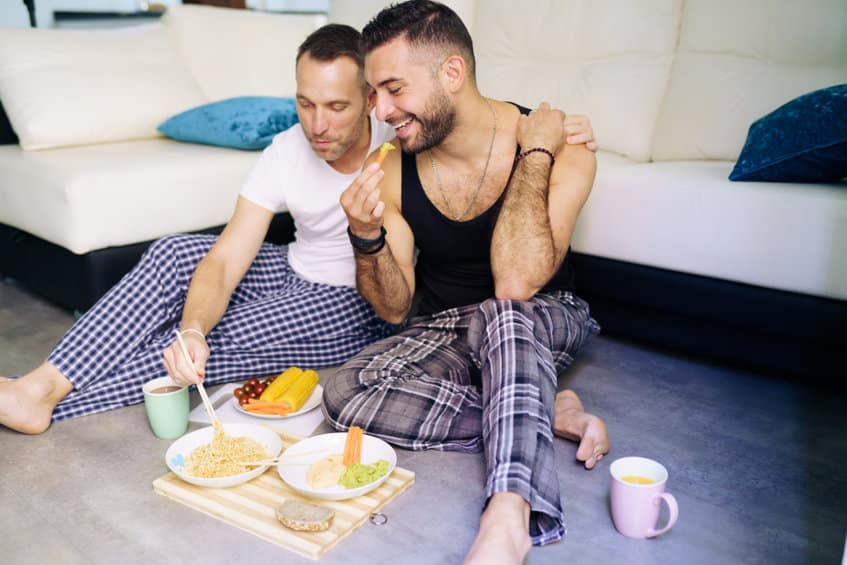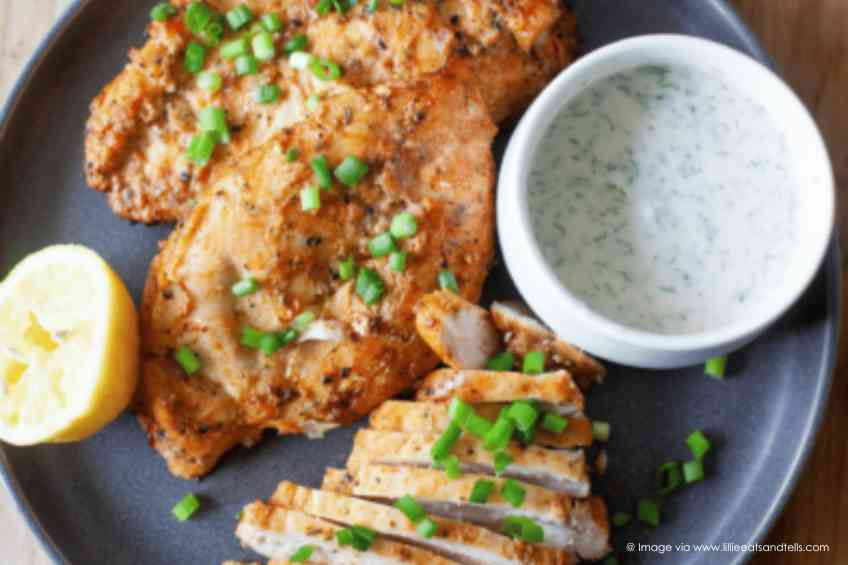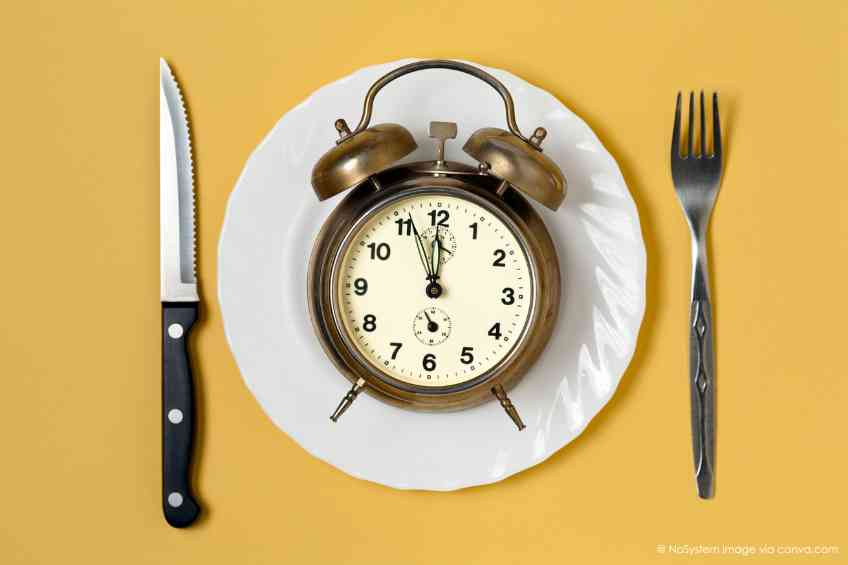Everyone is on a journey, some harder and more challenging than others. Certainly, members of the LGBTQ+ community face their own unique situations and issues as they navigate life. Some challenges, in fact, may be more apparent than others for these individuals, at least that’s what Daniel O’Shaughnessy came to realize. As a professional nutritionist and a gay man living in London, his background gave him unique insights into this diverse group. The author of Naked Nutrition: An LGBTQ+ Guide to Diet and Lifestyle recently spoke with WellWell on how nutrition, among other things, can provide LGBTQ+ members with first steps towards a healthier life.
How did you come to write this book? What Inspired you?
I was originally a drug addiction counselor, then I started seeing the power of food and then I trained in nutrition as a nutritional therapist. I’ve been in typical practice for about 10 years now and over time I’ve had LGBTQ+ depressed individuals coming to me. Also, my friend made me once go on a gay cruise and on the trip, I was thinking, “Well, I don’t want to just be one of those nutritionists that writes a book about my theory on nutrition. It would be boring, and it’s all been done.” So, I thought, “Well, what’s not been done?” I was on this cruise and surrounded by like 5000 people. In fact, it was mostly gay men and every time someone said to me, “What do you do for a living?” and I said, “I’m a nutritionist” and they said, “How do I recover from this week?” They were partying all week. And it just hit me. I thought, “Why is there no resource tailored to the LGBTQ+ population?” Just as there’s men’s health, there’s women’s health, there’s children’s health, why can’t there be a segment for this?”
In your practice, were you set up to deal with the LGBTQ community or were you focused on standard nutrition, and you just happen to have a significant number of clients in the LGBTQ community?
I make no secret that I’m an out gay man. So, I think naturally when people look at my postings on Instagram, I’m very out and proud. I think they naturally navigate towards me and think, “Well, this guy can talk to me in a very straight way. I can ask him sensitive questions.”
Is the community aware of its specific needs? There are a lot of different segments within the community, but generally are individuals aware they may have unique nutritional needs?
The heterosexual community is more open to the idea than the LGBT. Some gay men are like, “Why do we need it, why is the diet different?” and my response to it is, “stop thinking about diet being just about losing weight or gaining muscle. It’s not just about calories.” Food can actually be healing or can support a certain lifestyle. That’s always my answer to it. It’s a classic, don’t judge a book by its cover, right? And so, there might be some specific issues that are related to LGBTQ+ individuals. Also, some general health issues could be very much tailored. Like digestive health for example. It all has a knock-on effect because it automatically impacts my well-being. I don’t think, this is the first book of its kind, and I don’t think people fully realize the power of nutrition and what it can actually do to either make them feel a bit better if it’s a mental health issue or support in their medication, side effects for HIV or support for their hormone therapy for transgender health.
What type of feedback have you gotten on the chapters and the specific book? 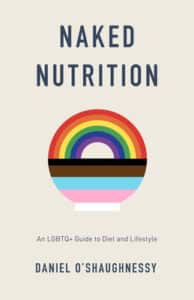
I think the main feedback was that it has become a resource that allows individuals to jump back in at different pieces as needed. It is not necessarily just a read through. I have a client that has had to read it two or three times because there’s a lot of information in the book. I emphasize to clients, friends, “Look, take one to two changes that you can try to apply to their life, then come back to the book again.” I also want someone to know my views on what carbs, protein and fats are, etc. and if you’re a complete beginner, that you can understand it.
Look, it’s not my place to say yes, there are illegal substances, yes you need to be mindful of safer injecting practices, go read that on your own. For example, with steroid use, it’s like, “Well, if you’re not going to train hard or eat well, this is going to be pointless for you.” So, I just wanted to make the user really aware of certain things. And it’s slightly different obviously with transgender and therapy because someone needs the hormones to be able to transition. So, it’s just making them aware this could happen because a lot of the time, I’ve had clients and friends say, “I’ve gone to the doctor, they’ve prescribed the medication, they’ve barely talked about what the transition process is, suddenly I can’t sleep or suddenly I’m having other problems.” So, especially with the transgender hormone, it’s a very lonely process and even if there’s a concerned parent, they can pick it up and say, “Well, this is what my child is going to be going through.”
You don’t limit the book to nutrition. It covers lifestyle as well, correct?
With lifestyle, I try to be as modern as I can. You can’t ignore and we have to admit that in our community there’s a small segment, mostly gay men, that will go out and party and take substances. Well, if you’re going to do that, again, the book can tell you here’s how to feel better from it next week. The book is non-judgmental. These are my observations of what goes on. Challenge me if you think that’s wrong. Especially with chapters around sex and the party lifestyle, these are things that someone might not know or are afraid to ask. The guidance just helps you enhance your overall being. Essentially, it’s how you are nourishing yourself before you go out and party so that you’re less likely to call out sick at work and you’ll feel better the next week.
How much does the lifestyle affect the health of the gay community? The gay community/the LGBTQ+ community, of course, is not homogenous, but are there lifestyle issues that cut across the entire community?
I think this is a better way to answer this. Gay men particularly grow up with shame. We always feel not good enough and there’s brilliant books like The Childhood Rage that talk about how we grew up and we’re constantly told, “You’re not good enough. You’re different.” And so, it doesn’t matter how you feel about yourself, you always feel different and, in that perspective, there might be things that we do that impact us, but I can’t make assumptions for the whole LGBT community.
So, for example, GDL and crystal meth are drugs that gay men use. We can ask whoever why, but it doesn’t matter. Some might just want to use it for a good time. Some might want to use it because of the shame factor or some other issue. So, over time the lifestyle might not have necessarily changed as much but maybe the drugs have changed. And if you look at like 1980’s, you know, we used to go partying. But the drugs and substances have become a lot more serious. So, people are partying, they’re having a lot more sex with sexual drugs and partying often for days. I ‘m not trying to label anyone or put any shame on anything, I’m just saying that this happens whether we like it or not. It doesn’t happen everywhere but here’s a book to help. Just try to eat a meal when you get home, have some water or take this supplement or whatever it is. Or just follow the advice, 80/20, just to feel better about yourself.
I have seen many individuals who are partying a lot, taking a lot of substances plus taking steroids plus having mental health problems plus maybe living with HIV. It’s like a lot to deal with. They’re in this cycle and it’s just well, why? I think a lot of it come down to the question: “Do we love ourselves?” And it’s a very loaded question and it does dig into a lot of trauma. It’s a very hard thing to answer. To link to what I actually said in the beginning, we spend all our years in this chain of not feeling good enough, so why should we love ourselves? This may then lead to us not respecting our bodies and not looking after ourselves. That’s the point of my book. This is your first step. Maybe just eating a little better or just maybe covering this lifestyle factor, just start the process of self-help.” And then taking responsibility for your own health.
Are there issues or information that surprised you as you were writing this book?
The two things that really surprised me was, first of all, the HIV chapter was probably the hardest for me to write because you have to be so careful about all possible medication interactions and looking at supplements. It’s a total minefield. There are so many interactions with HIV medications. Transgender also was eye opening. Looking at all that someone actually goes through when they go through a transition. It’s such a huge process that if someone’s doing that, it is the path to what they want, their path to self love. After writing that chapter, I just sat and thought, “I have so much respect for these individuals.” Some people go through the transition completely fine. Others may have some side effects. It’s a really strong process and not someone saying, “Oh, suddenly I just want to change sex.” I think that was like the big stand out for me
Your book is very wide in a good way, dealing with a lot of different issues. But are there certain things you want people to take away? It could be rest, something about nutrition, being aware of what an individual is going through?
Yeah, I want people to be aware of what LGBTQ+. health needs are. Whether they do anything about it or not, just be aware. Obviously, it’s a world of information so it’s too important to simply go, “look, be easy on yourself.” Don’t look at it like a crash diet and think, “Today, I’m going to increase my protein and drink more water.” It’s just too overwhelming because you’re living in this stressful state. I want people to really read the mental health chapter. I think that’s really important for everyone because that talks a lot also about what you can do nutritionally to support mental health. You might not be able to take away the drivers of mental health or the trauma, but you can really start to support your body. It’s really hard to tell someone who’s LGBT to go a bit easy on yourself, we’re so very hard on ourselves. I want to help people give themselves a bit of a break. It’s okay and that’s an important message coming from the book.
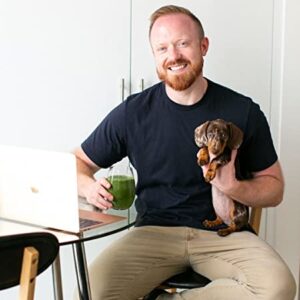
About Daniel O’Shaughnessy
Daniel O’Shaughnessy IFMCP is an award-winning nutritionist and certified functional medicine practitioner. He has helped over a thousand clients achieve better health through information, understanding and nutrition.
Naked Nutrition: An LGBTQ+ Guide to Diet and Lifestyle can be purchased at Amazon.

